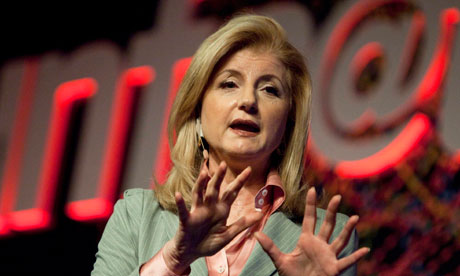
Creative people, especially writers, are a funny breed. We are the only profession I know of who work for free. No coal miner, nurse, shipyard worker, accountant, or any other person with bills to pay works for free. But, that is what writers are often being forced to do. And the consequences for creativity and democracy are dire.
When I and several other colleagues sued the Huffington Post last April, we argued that thousands of bloggers, who made the web aggregator a valuable commodity, deserved a share of the $315m paid by AOL to purchase the site; our legal counsel is closely examining a lower court's ruling earlier this month that dismissed the case. But, legal arguments aside, our case raises fundamental questions for authors, and society.
In one sense, nothing is new. Each generation brings a new technology or a new invention or a new market – and each time the people who create the content are told: "Be grateful that we, the barons of the media world, deign to give your work exposure, and don't complain or don't ask for more. Be happy with the exposure you get." The new twist today is, "praise be, the internet god is here, and since anyone can bang out some prose, we think you should work for free". But, this is not a story about technology. It's about power.
More than two centuries ago, copyright was inscribed in the US constitution, giving Congress the power "To promote the progress of science and useful arts, by securing for limited times to authors and inventors the exclusive right to their respective writings and discoveries". The idea behind that was simple: copyright is something to benefit society – "the progress of science and useful arts" – and authors.
The constitution's framers understood an obvious thing: if authors are not paid a fair wage by controlling their work and earning a living, then there will not be an incentive to keep writing – and they wanted to keep power out of the hands of one king or powerful entity.
In the modern world, media companies, the new kings of information, have exercised enormous power, slowly but surely seizing away the rights to authors' works via horrific contracts, then imposing poverty-inducing conditions on anyone who wants to produce creative works. I understand why people feel forced to write for free – creators exist to have their work seen and consumed by others. It's fear, not freedom, that drives creators to succumb.
Working for free, however, is not something we should accept as a norm that media companies can exploit. If you flip through corporate reports or media stories you may note that, magically, billions of dollars are flowing into their coffers and top media executives are making millions of dollars in pay and benefits. When those executives donate their work, perhaps, creators will reconsider their own demands for compensation.
Indeed, that brings me to the larger issue consumers should keep in mind. I understand that more people, especially those under 30, believe that the advent of the internet ushered in an era of "information is free", that anyone can be a "writer" and, perhaps, the idea of a paid creator is a thing of the past. But, it is a truth that, even in the age of the internet, where we think things are free, some very big powerful corporations are making, and will make, billions of dollars.
Ultimately, that's because this is about power. Actors, news writers, screen writers and some journalists make a decent living because unions established basic conditions and marshalled power – the "work for free" virus has spread precisely because millions of creators throughout the world lack collective organisation. That isn't inherent in what we do – it's because we've failed to get out of our pyjamas and on to the streets.
What is happening to authors is another example of the bankruptcy of a system some call "the free market". We have to see that simply as a slogan used by the elite to exploit and intimidate others and then toss a few crumbs back for the rest of us to fight over. In that sense, authors are not a different breed at all and we must stand ready to challenge a system that is a threat to democracy and creativity.
• Follow Comment is free on Twitter @commentisfree

